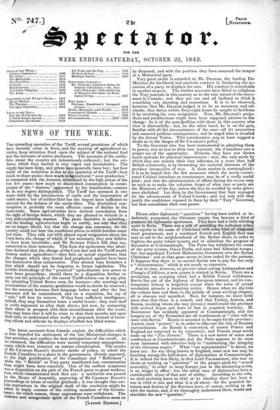Divers other diplomatic "questions " having been settled or in- definitely
postponed, the Ottoman empire has become a kind of preserve for diplomatic sportsmen. They have had a little nibbling
sport in Syria. There was a talk of providing the turbulent tribes who rejoice in the name of Christians with some kind of congenial local government, and a combined French and English fleet was sent to sail in the neighbourhood of the Syrian shore, in order to frighten the petty inland tyrants, and to stimulate the progress of but has appointed Turkish Mahometan Governors over the Syrian Christians : and so that game seems to have ended for the present. It happens that there is no second Syrian war to pay for, but only a " demonstration," which is not nearly so expensive.
Just in time, however, to prevent ennui among Ambassadors and Charges d'Affaires, a new quarry is started in Servia. There are a
revolution, an usurping chief, and a British Consul withdrawn. Servia lies out of the highway of European interest, and its con- temporary history is forgotten except when the noise of actual revolution attracts a transitory notice. Hence, when we dip into the volume here and there in the middle of some exciting chapter, all is obscure and mystified. Now, for instance, we know little
more than that there is a tumult, and that Turkey, Austria, and Russia, (seeking whom she may devour,) stand round the province with revived hopes and fears of lost or acquired territory. M.
BONTENIEF has suddenly appeared at Constantinople, and the
hangers-on of the Embassies are all wonderment at " what will be done with Servia." Russia is assumed to be eager for the province:
Austria must " protect " it, in order to dike-out the tide of Russian encroachment. As Russia is concerned, of course France and England are supposed to be concerned ; and Prussia must needs
make up the "Five Powers." There is a new storm of notes and
conferences at Constantinople, and the Porte appears to be once more harrassed with obtrusive help in "maintaining the integrity
of the Ottoman empire." What "our representative" is about, we
know not : for any thing known in England, some new war may be hatching among the half-dozen of diplomatists at Constantinople.
It is indeed the less likely, in that Lord PALMERSTON, who was so clever at working up "questions" to the proper pitch for "armed neutrality," in order to keep Europe just at the simmering-point, is no longer in office : but the whole race of diplomatist's have a considerable share of that sort of ability. According to the rule, we shall probably know in 1843 or '44 whether there has been a war its 1842 or not, and what it is all about : for the practical in- terests and desires of the Servians have, of course, nothing to do with the matter, and, if we thoroughly understood them, would not elucidate the new " question."


























